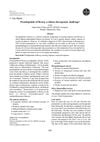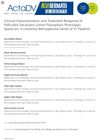 1 citations,
January 2015 in “Springer eBooks”
1 citations,
January 2015 in “Springer eBooks” The document says a skin condition called alopecia areata causes hair loss and stress, and is treated with strong skin creams, injections, or other therapies, but treatment success varies.
 1 citations,
July 2014 in “Our Dermatology Online”
1 citations,
July 2014 in “Our Dermatology Online” The patient with both scarring and non-scarring hair loss showed complex immune reactions and improved with steroid treatment.
 1 citations,
January 2014 in “Health Renaissance”
1 citations,
January 2014 in “Health Renaissance” Pseudopelade of Brocq is hard to diagnose and treat, with limited effective options.
 1 citations,
January 2014 in “Hair therapy & transplantation”
1 citations,
January 2014 in “Hair therapy & transplantation” Platelet-rich plasma treatment is not very effective for chronic severe alopecia areata.
 1 citations,
July 2012 in “Springer eBooks”
1 citations,
July 2012 in “Springer eBooks” The document concludes that more research is needed to better understand and treat scarring hair loss conditions.
 1 citations,
April 2012 in “Informa Healthcare eBooks”
1 citations,
April 2012 in “Informa Healthcare eBooks” Some medications for inflammation can cause a condition with scalp rashes and hair loss, often linked to Crohn's disease, and may require treatment changes to prevent permanent hair loss.
1 citations,
August 2005 in “Springer eBooks” Alopecia areata is an autoimmune disease with genetic links, treatable with certain medications, and can affect mental health.
November 2024 in “Journal of Cosmetic Dermatology” This document presents a case report of a 21-year-old female who developed dermal filler-induced alopecia, a rare complication associated with vascular occlusion and tissue ischemia following aesthetic procedures. After receiving 7 mL of hyaluronic acid filler injections in the temples, tear trough, and eyebrow glabella regions, the patient experienced localized skin necrosis and hair loss. Diagnosis was confirmed through trichoscopy, revealing follicular dropout and white dots. Treatment involved hyaluronidase injections, intralesional corticosteroids, topical minoxidil, and CO2 laser therapy, leading to complete hair regrowth and resolution of scarring over a year. The report highlights the importance of early recognition and intervention, with only 16 cases documented, emphasizing the need for awareness and adherence to safe injection practices to prevent such adverse outcomes.
 August 2024 in “JEADV Clinical Practice”
August 2024 in “JEADV Clinical Practice” Mesotherapy with dutasteride improves hair growth and reduces symptoms in frontal fibrosing alopecia.
 August 2024 in “Clinical Cosmetic and Investigational Dermatology”
August 2024 in “Clinical Cosmetic and Investigational Dermatology” Enzyme injections can effectively treat epidermoid cysts without surgery.

Baricitinib helped treat a man's beard hair loss when steroids didn't work.

Current treatments for alopecia areata often fail to achieve and maintain significant hair regrowth.
 February 2024 in “Acta dermato-venereologica”
February 2024 in “Acta dermato-venereologica” This type of hair loss is probably often missed and treatments reducing inflammation might work well.
 December 2023 in “European journal of dermatology/EJD. European journal of dermatology”
December 2023 in “European journal of dermatology/EJD. European journal of dermatology” More effective treatments are needed for severe alopecia areata.
 November 2023 in “Aktualʹnì problemi sučasnoï medicini”
November 2023 in “Aktualʹnì problemi sučasnoï medicini” The guidelines suggest using various treatments, including antidepressants and steroids, for alopecia areata and discuss the condition's genetic and immune aspects.

Tofacitinib helped a woman with total-body hair loss grow her hair back.
 August 2023 in “JAAD international”
August 2023 in “JAAD international” Pediatric dermatologists have varied preferences for treating alopecia areata in children, with no standard FDA-approved treatments and some using JAK inhibitors despite risks.
 August 2023 in “Dermatology and Therapy”
August 2023 in “Dermatology and Therapy” Experts recommend personalized treatment plans for best outcomes in managing Alopecia Areata.
 August 2023 in “JAAD Case Reports”
August 2023 in “JAAD Case Reports” A woman with lupus experienced hair regrowth after treatment, but hair transplantation is not advised for her condition.
 August 2023 in “Journal of The American Academy of Dermatology”
August 2023 in “Journal of The American Academy of Dermatology” Early treatment is key for permanent hair loss disorders, with options ranging from medications and phototherapy to immunomodulators and antibiotics, depending on severity and type.
 July 2023 in “Skin Research and Technology”
July 2023 in “Skin Research and Technology” Baricitinib combined with other immune therapies may safely and effectively treat severe scalp hair loss.
 July 2023 in “Deleted Journal”
July 2023 in “Deleted Journal” Alopecia areata is the most common type of baldness treated with corticosteroids and minoxidil.
 June 2023 in “JAAD case reports”
June 2023 in “JAAD case reports” A rare scalp condition, cutis verticis gyrata, was found in a woman with primary scarring alopecia.
 June 2023 in “British journal of dermatology/British journal of dermatology, Supplement”
June 2023 in “British journal of dermatology/British journal of dermatology, Supplement” A nurse-led hair service reduced waiting times and improved patient satisfaction and outcomes for alopecia areata treatment.

Both treatments for localized alopecia areata are equally effective.
 May 2023 in “Elsevier eBooks”
May 2023 in “Elsevier eBooks” Some treatments that modify the immune system might help with certain types of hair loss but haven't been explored for common hair loss alone.
 May 2023 in “Journal of medical case reports”
May 2023 in “Journal of medical case reports” A young girl with skin and scalp conditions showed some improvement with treatment.
 April 2023 in “Journal of Investigative Dermatology”
April 2023 in “Journal of Investigative Dermatology” Cryotherapy might help regrow hair in Alopecia Areata, but more consistent research is needed.

A patient with patchy hair loss was successfully treated for Tumid Lupus Erythematosus after other treatments failed.
 January 2023 in “The Egyptian Journal of Hospital Medicine”
January 2023 in “The Egyptian Journal of Hospital Medicine” New treatments for sudden hair loss include oral medications and a special laser, both showing promise in hair regrowth.



























